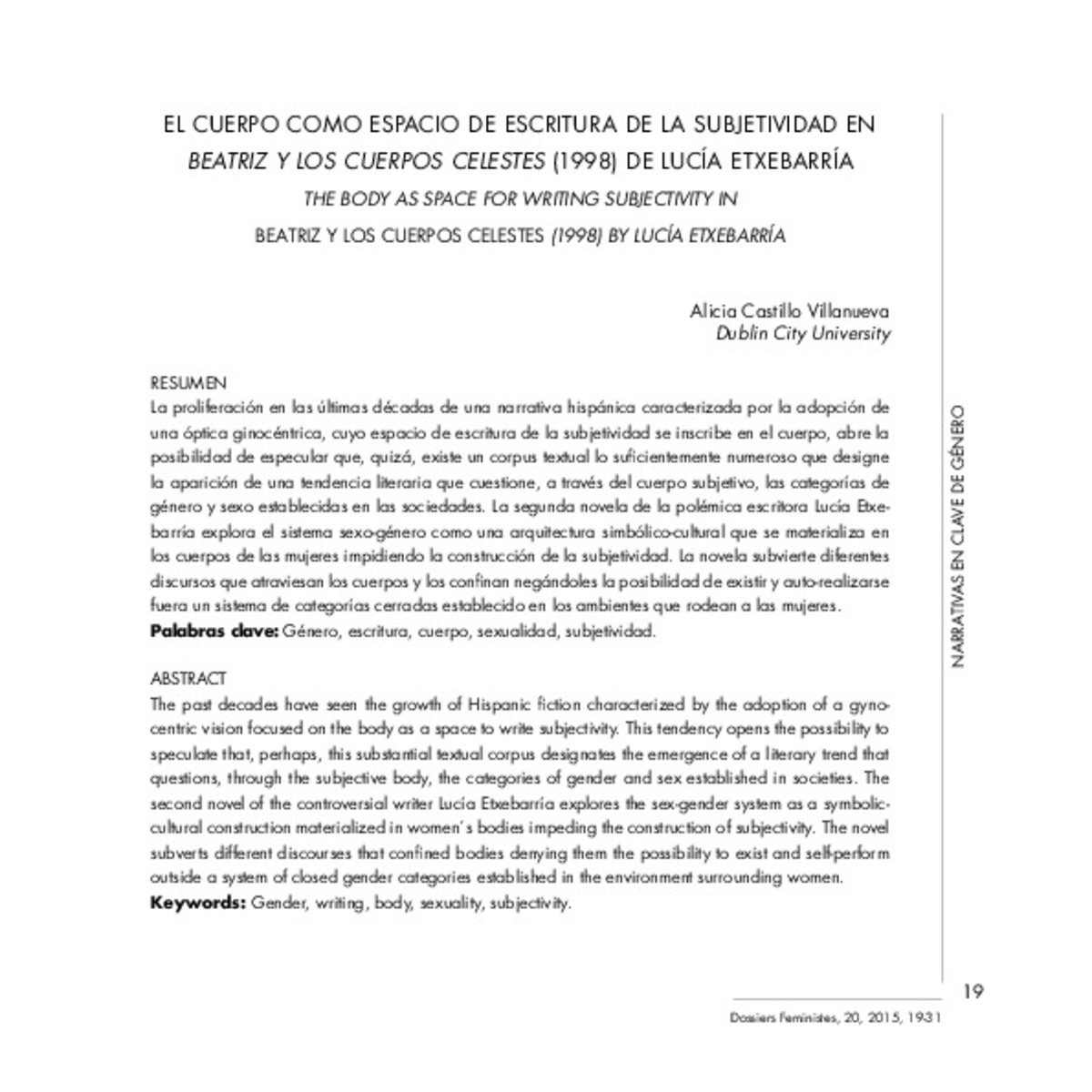Mostrar el registro sencillo del ítem
El cuerpo como espacio de escritura de la subjetividad en Beatriz y Los Cuerpos Celestes (1998) de Lucía Etxebarría
| dc.contributor.author | Castillo Villanueva, Alicia | |
| dc.date.accessioned | 2017-02-28T12:38:47Z | |
| dc.date.available | 2017-02-28T12:38:47Z | |
| dc.date.issued | 2015 | |
| dc.identifier.citation | CASTILLO VILLANUEVA, Alicia. El cuerpo como espacio de escritura de la subjetividad en Beatriz y Los Cuerpos Celestes (1998) de Lucía Etxebarría. Dossiers feministes, 2015, no 20, p. 19-31. | ca_CA |
| dc.identifier.issn | 1139-1219 | |
| dc.identifier.issn | 2340-4930 | |
| dc.identifier.uri | http://hdl.handle.net/10234/166331 | |
| dc.description.abstract | The past decades have seen the growth of Hispanic fiction characterized by the adoption of a gynocentric vision focused on the body as a space to write subjectivity. This tendency opens the possibility to speculate that, perhaps, this substantial textual corpus designates the emergence of a literary trend that questions, through the subjective body, the categories of gender and sex established in societies. The second novel of the controversial writer Lucía Etxebarría explores the sex-gender system as a symboliccultural construction materialized in women´s bodies impeding the construction of subjectivity. The novel subverts different discourses that confined bodies denying them the possibility to exist and self-perform outside a system of closed gender categories established in the environment surrounding women. | ca_CA |
| dc.description.abstract | La proliferación en las últimas décadas de una narrativa hispánica caracterizada por la adopción de una óptica ginocéntrica, cuyo espacio de escritura de la subjetividad se inscribe en el cuerpo, abre la posibilidad de especular que, quizá, existe un corpus textual lo suficientemente numeroso que designe la aparición de una tendencia literaria que cuestione, a través del cuerpo subjetivo, las categorías de género y sexo establecidas en las sociedades. La segunda novela de la polémica escritora Lucía Etxebarría explora el sistema sexo-género como una arquitectura simbólico-cultural que se materializa en los cuerpos de las mujeres impidiendo la construcción de la subjetividad. La novela subvierte diferentes discursos que atraviesan los cuerpos y los confinan negándoles la posibilidad de existir y auto-realizarse fuera un sistema de categorías cerradas establecido en los ambientes que rodean a las mujeres. | ca_CA |
| dc.format.extent | 13 p. | ca_CA |
| dc.format.mimetype | application/pdf | ca_CA |
| dc.language.iso | spa | ca_CA |
| dc.publisher | Universitat Jaume I. Institut Universitari d'Estudis Feministes i de Gènere | ca_CA |
| dc.relation.isPartOf | Dossiers feministes, 2015, no. 20 | ca_CA |
| dc.rights.uri | http://rightsstatements.org/vocab/CNE/1.0/ | * |
| dc.subject | género | ca_CA |
| dc.subject | escritura | ca_CA |
| dc.subject | cuerpo | ca_CA |
| dc.subject | sexualidad | ca_CA |
| dc.subject | subjetividad | ca_CA |
| dc.subject | gender | ca_CA |
| dc.subject | writing | ca_CA |
| dc.subject | body | ca_CA |
| dc.subject | sexuality | ca_CA |
| dc.subject | subjectivity | ca_CA |
| dc.title | El cuerpo como espacio de escritura de la subjetividad en Beatriz y Los Cuerpos Celestes (1998) de Lucía Etxebarría | ca_CA |
| dc.title.alternative | The body as space for writing subjectivity in Beatriz y Los Cuerpos Celestes (1998) by Lucía Etxebarría | ca_CA |
| dc.type | info:eu-repo/semantics/article | ca_CA |
| dc.rights.accessRights | info:eu-repo/semantics/openAccess | ca_CA |
| dc.relation.publisherVersion | http://www.e-revistes.uji.es/index.php/dossiers/article/view/1756/1795 | ca_CA |







